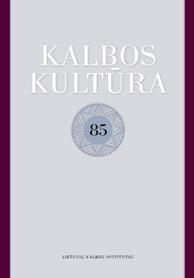Abstrakčiųjų daiktavardžių daugiskaitos vartojimas ekonomikos kalboje ir norma
The usage of abstract nouns in plural in the language of economics and the norm
Author(s): Ramunė VaskelaitėSubject(s): Baltic Languages
Published by: Lietuvių Kalbos Institutas
Keywords: abstract nouns; singularia tantum; inflectional change in number; increase in concreteness of meaning; derivates;norm; usage;
Summary/Abstract: The article deals with the topical issue of singular abstract nouns used in plural in one particular domain of modern Lithuanian – the language of economics. Factors determining and supporting such usage are discussed. Insufficient determinacy of codified norm can be viewed as one of the factors: publications codifying the language mention only the exception when the meaning becomes more concrete, though concreteness can have a different degree. When only opposing margins of the norm and mistake are indicated (usage of a concrete noun is viewed as correct and of an abstract noun as incorrect) the users are entitled to make a decision about every borderline case.Analysis of particular groups of nouns uncovers other factors supporting the usage of abstract nouns in plural. It appears that the plural of the most typical representative of abstract nouns – derivates with the suffix -imas (-ymas) is not only a sign of a change in meaning. Quite a few of such derivates are used in the plural in texts of economics as terms and some of them are included in dictionaries of economics; this encourages the creation and usage of new terms in plural based on analogy with existing terms.Another group of abstracts in plural raises the importance of such a factor as avoidance of ambiguity – a noun in the singular could be ambiguous in a particular context. This factor ought to be related with previously mentioned factors of concreteness of the meaning and necessity to express an opposition “one – many”.The codified norm allows an exception for one group of nouns in the singular – names of materials – to be used in plural in order to express a variety of kinds. The usage researched shows that this exception is also being applied to abstract nouns.Probably the main factor supporting the abstracts in plural is the increase in concreteness of meaning which is recognized by the norm, although the usage shows that there are some secondary or separate factors. These factors are strong and complex, therefore norms ought to be evaluated appropriately and the usage of abstracts in plural should not be linked with the influence of other languages alone.This article is an initial attempt to investigate this particular subject important for usage. It is being researched on the basis of data from one domain of the standard language, though this analysis might encourage the research to be extended to other domains. This would allow more reliable conclusions to be drawn about the spreading of abstract nouns in plural and their inherence in different styles.
Journal: Bendrinė kalba (iki 2014 metų – Kalbos kultūra)
- Issue Year: 2012
- Issue No: 85
- Page Range: 190-215
- Page Count: 26
- Language: Lithuanian

